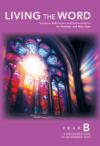Scripture Study for
Second Sunday of Advent
Isaiah 11:1–10 / Psalm 72:7 / Romans 15: 4–9 / Matthew 3: 1–12 /
<< Back to LECTIONARY RESOURCES
Understanding the Word
By Dianne Bergant, C.S.A.
Isaiah wrote of a time when the monarchy had been conquered and there seemed to be no hope for a future king. Yet out of this “stump” a new ruler would emerge. The image of his “peaceable kingdom” recalls the primal paradise of Eden (see Genesis 2), where the animals did not follow their predatory instincts, and natural enemies lived in harmony with each other. In this new reign, all creation will be either transformed or recreated. This vision is not a return to the past, but one of future peace and fulfillment.
Paul bases his teaching of universal salvation for all on God’s original promise that Abram and his descendants would be a source of blessing for others (see Genesis 12:2; 22:18). Paul argues that it was in fulfillment of this promise that the Gentiles have been brought into the family of God through the love of Christ. In his prayer for the community, he asks for three different expressions of unity: “to think in harmony,” to be in “one accord,” and to glorify God in “one voice” (Romans 15:5–6). This unity in no way obliterates the differences between Jew and Gentile; it is a unity in diversity.
John’s baptism was neither the kind that proselytes to Judaism underwent, nor the repeated ritual cleansing that the Essene community of Qumran practiced. It was a devotional rite with eschatological significance, administered to Jews, accompanied by their acknowledgment of sinfulness and a resolve to live an ethical life. John admits his subordinate role when compared with Jesus. He, John, is the voice that announces the coming of another. The winnowing of which he speaks refers to the separation of those who respond to John’s call to repentance from those who do not. John does not act as judge; the one who is to come will do the judging. In other words, the time of the Messiah will be a time of both redemption and judgment.
